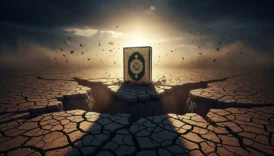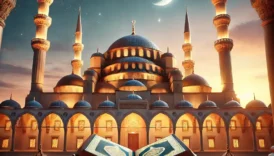According To The Qur’an, Is The World Actually Hell?
Dear brothers and sisters, today we will explore certain Qur’anic verses and the interpretations suggesting that this worldly life, which we typically regard as a realm of test and trial, could possibly be seen as one of the layers of Hell. This perspective emerges from the linguistic and contextual analysis of terms like “Sekar,” “Sair,” “Leza,” and “Hutame” in the Qur’an. Of course, not all scholars agree on this interpretation; there are various exegetical approaches within Islam. Here, we aim to convey one viewpoint that correlates the hardships and injustices of this world with a “Hell-like” dimension, reflecting on the human experience from a heartfelt, faithful perspective.
- According To The Qur’an, Is The World Actually Hell?
- The Concept Of Sekar And The Dimension Of The Earth
- “Sair” As The Realm Of Torment And The Earthly Plane
- Leza And Torment At The Cellular Level
- Hutame And The Torment Of The Nafs (Self)
- Sekak: The Earthly Layer As A Realm Of Torment
- Surah Maryam (19:69-71) And Returning To Earth
- Adam’s Descent And The Testing Of Humanity
- The Purpose Of This Life And The Importance Of Patience
- Balancing Torment And Divine Mercy
- The Qur'an As A Guide
- Final Word
- References
The Concept Of Sekar And The Dimension Of The Earth
In the Qur’an, we find indications that just as Paradise has layers or levels, Hell also has different levels or “layers.” The word “Sekar” is used in reference to one such layer of Hell. Certain commentators suggest that when we trace the root meaning and usage of “Sekar,” we see references not only to a purely spiritual or otherworldly realm but potentially to the earth or the entire three-dimensional material universe. This approach posits that the pain, disease, evil, and oppression in the physical world might form a dimension of torment.
Surah Al-Muddaththir (74:28-29) mentions “Sekar,” highlighting the severity of its punishment. The verses indicate there is no escape from the torment of Sekar, urging humankind to be ever aware of its reality:
Arabic:
اِنَّهَا لَا تُبْقِي وَلَا تَذَرُTransliteration:
Innahā lā tubqī wa lā tadharMeaning:
“It (Sekar) leaves nothing and spares nothing.” (Al-Muddaththir 74:28)
From this, some interpreters reason that the afflictions of our world—pain, injustice, and sorrow—can act as reflections or manifestations of this deeper, more encompassing concept of “Sekar.”
“Sair” As The Realm Of Torment And The Earthly Plane
The Qur’an uses “Sair” to refer to a place of ongoing punishment, mentioned in various verses (reportedly 14 distinct places). In this viewpoint, “Sair” might also point to the worldly plane where oppression, war, hunger, and moral decay cause a “Hell on Earth” for many people. The expression “arzdar arz” is sometimes interpreted to mean not merely the planet Earth but also the entire physical cosmos. From that standpoint, the perpetual sufferings and miseries in our tangible existence could be read as part of a “punitive dimension.”
It is undeniable that the world is a place where injustice, cruelty, and pain often manifest. In that sense, it can appear “Hell-like,” especially for those who experience severe oppression or affliction. However, as believers, we must also remember that the same world can become a place of profound spiritual growth and moral fortitude when approached with faith and steadfastness.
Leza And Torment At The Cellular Level
In Surah Al-Ma’arij (70:15-16), “Leza” describes a fierce fire that has the power to scorch a person down to their very core. Some exegeses equate “Leza” with a most painful, physical and spiritual affliction that penetrates to the smallest aspect of one’s being. These verses underscore how intensely a soul may suffer when burdened by wrongdoing or spiritual failure.
Arabic:
كَلَّا اِنَّهَا لَظٰى. نَزَّاعَةً لِّلشَّوٰىTransliteration:
Kallā innahā laẓā. Nazzaa‘atan lishshawā.Meaning:
“Indeed, it is a scorching fire. It tears away at the skin.” (Al-Ma’arij 70:15-16)
According to some, this indicates that someone suffering from spiritual desolation might experience a torment so intense it feels as though every cell is in agony. In a worldly sense, individuals could also face deep anguish—both physical and psychological—paralleling this image of leza. Such experiences can be viewed as a reflection of the spiritual torment alluded to in these verses.
Hutame And The Torment Of The Nafs (Self)
In Surah Al-Humazah (104:4-7), the Qur’an introduces “Hutame.” This word can be translated as “the crusher” or “that which breaks to pieces.” Qur’anic usage portrays it as a fire that shatters both body and spirit. Various commentators emphasize that “Hutame” can be understood as an inward, soul-level anguish capable of manifesting even in worldly life through spiritual turmoil, anxiety, and regret.
The verses read:
Arabic:
نَارُ اللّٰهِ الْمُوقَدَةُ. الَّتِي تَطَّلِعُ عَلَى الْاَفْئِدَةِTransliteration:
Nārullāhil mūqadah. Allatī taṭṭali‘u ‘alal-af’idahMeaning:
“(It is) the fire of Allah, (eternally) kindled, which rises over the hearts.” (Al-Humazah 104:6-7)
From this perspective, “Hutame” is a metaphor for the burning remorse within the human self. Hatred, envy, selfishness, and malice can “burn” a person from the inside, making their worldly existence a genuine form of internalized punishment.
Sekak: The Earthly Layer As A Realm Of Torment
Some refer to “sekak,” occasionally linked in meaning to “Sekar,” to highlight that the “layer” in which humanity resides could be the uppermost echelon of Hell’s multiple layers. In this interpretation, our world, rife with injustices, diseases, fears, and oppression, has strong resemblances to a place of punishment. History shows us how frequently injustice reigns, with the weak crushed by the powerful. Unscrupulous individuals thrive in deception, while the innocent and vulnerable suffer under oppression. The cruelty of such a realm seems to embody the “Hellish” qualities portrayed in the Qur’an.
Such an atmosphere, rife with cruelty and unfairness, can be described as a “daemonic” or “Dajjal-like” environment, wherein wrongdoing and corruption appear to hold sway. The occupant of such a plane might endure an existence that truly feels infernal.
Surah Maryam (19:69-71) And Returning To Earth
Verses in Surah Maryam (19:69-71) discuss how every soul shall pass through Hell. The language has led some interpreters to apply it to this world as well, suggesting that earthly life is a form of “Hell” that everyone experiences at least once, tied to the notion of the descent of Adam (peace be upon him) from Paradise to the realm of the earth.
Arabic:
ثُمَّ لَنَنْزِعَنَّ مِنْ كُلِّ شِيعَةٍ اَيُّهُمْ اَشَدُّ عَلَى الرَّحْمٰنِ عِتِيًّاTransliteration:
Thumma lananzi‘anna min kulli shī‘atin ayyuhum ashaddu ‘ala’r-Raḥmāni ‘itiyyāMeaning:
“Then We will surely extract from every sect those of them who were most rebellious against the Most Merciful.” (Maryam 19:69)
Arabic:
ثُمَّ لَنَحْنُ اَعْلَمُ بِالَّذ۪ينَ هُمْ اَوْلٰى بِهَا صِلِيًّاTransliteration:
Thumma la-naḥnu a‘lamu bi-lladhīna hum awlā bihā ṣiliyāMeaning:
“Then indeed We know best who most deserves to be cast therein.” (Maryam 19:70)
Arabic:
وَاِنْ مِنْكُمْ اِلَّا وَارِدُهَا ۚ كَانَ عَلٰى رَبِّكَ حَتْمًا مَقْضِيًّاTransliteration:
Wa in minkum illā wāriduhā. Kāna ‘alā rabbika ḥatman maqḍīyāMeaning:
“There is none of you but will come to it (Hell). This is an inevitable decree of your Lord.” (Maryam 19:71)
Interpreters holding this view argue that when Adam and his progeny left Paradise and entered this earthly realm, it was effectively an entry into a Hellish domain. By extension, humanity, collectively, must “pass through” or dwell in this dimension of affliction.
Adam’s Descent And The Testing Of Humanity
The Qur’an narrates how Adam (peace be upon him) was sent down from Paradise after disobedience, introducing the concept of humankind living in a realm of test. While most scholars emphasize that this is primarily a “trial environment,” a portion of commentators interpret these trials as reflective of a Hellish state—meaning that the world itself, fraught with sorrow, struggle, and heartbreak, echoes certain aspects of Hell.
Adam’s descent to the “earth” (Bakara 2:36) demonstrates the shift from a blissful, luminous existence to one of sorrow, hardship, and conflict. Many experience life as a sequence of tribulations: sickness, poverty, injustice, and relentless adversity. For some, these hardships indeed resemble an inferno of constant suffering.
The Purpose Of This Life And The Importance Of Patience
If the world truly carries “Hell-like” qualities, then our mission here involves endurance, moral integrity, and the cultivation of faith. The Qur’an and hadith emphasize that life is a test—a temporary stage where patience (sabr) and sincere devotion (iman) pave the way for eternal salvation.
In a hadith, the Messenger of Allah (peace and blessings be upon him) said, “The world is a prison for the believer and a paradise for the unbeliever.” (Muslim, Zuhd, 3). Some see in this statement a subtle nod to the idea that, for a believer, the world is far from an easy place; it can feel akin to a jail—or even a “Hell”—where one must strive against all forms of evil and temptation. As such, patience and fortitude are necessary to remain upright on the path of truth.
Balancing Torment And Divine Mercy
It is essential to remember that, in the Qur’an, discussions of punishment are always counterbalanced with reminders of Allah’s infinite mercy. Although the world can present Hell-like experiences—illness, oppression, and strife—Allah also extends opportunities for guidance, forgiveness, and spiritual growth.
Thus, the world is not exclusively a realm of despair. It is also filled with God’s signs of compassion, beauty, and wondrous creation. Humans can find pockets of “relief” and “grace” even in the midst of their trials. Much depends on our relationship with Allah and our moral stance against life’s injustices.
The Qur’an As A Guide
The Qur’an continuously reminds humankind that the worldly life is fleeting, while the Hereafter is the true abode (Al-‘Ankabut 29:64). Though the notion of worldly existence being “Hell-like” might sound disheartening, the Qur’an also proclaims that “with hardship comes ease” (Ash-Sharh 94:5-6). Indeed, believers are called upon to remain vigilant, to actively fight injustice, and to seek refuge in Allah’s guidance.
Even if the world can appear as a Hellish dimension, believers should persist with patience, righteousness, and good deeds. Ultimately, our real objective is to achieve success in the Hereafter. The teachings of the Qur’an and the sayings of the Prophet (peace be upon him) remind us repeatedly that we are here but for a moment, and that we must prepare for the eternal realm where true justice and ultimate peace prevail.
Final Word
Dear brothers and sisters, the idea that this physical world might constitute one layer of Hell, or reflect certain Hellish aspects, remains an interpretive viewpoint within the broader tapestry of Qur’anic exegesis. Undoubtedly, we witness widespread suffering, oppression, and moral decay in this domain—phenomena that can indeed feel “infernal.” Yet, the Qur’an and Sunnah also call us to perseverance, hope, and unwavering trust in Allah’s mercy.
No matter the adversity, the responsibility rests upon us to strive for righteousness, embody moral virtues, and work to alleviate injustices. By doing so, we can transform even the darkest arenas into avenues for divine blessing. Allah’s revelations and the example of the Prophet (peace be upon him) serve as our compass, reminding us that, although this abode may at times be Hell-like, it is also the very station where we can earn Allah’s good pleasure and ultimately attain the bliss of Paradise.
References
- Ibn Kathir, Tafsīr al-Qur’ān al-‘Aẓīm, Istanbul: Çağrı Yayınları.
- Al-Tabarī, Jāmi‘ al-Bayān ‘an Ta’wīl Āy al-Qur’ān, Istanbul: Türkiye Diyanet Vakfı Yayınları.
- Fakhr al-Dīn al-Rāzī, Mafātīḥ al-Ghayb (Tafsīr al-Kabīr), Istanbul: Dârü’t-Tıbâa.
- Elmalılı Hamdi Yazır, Hak Dini Kur’an Dili, Istanbul: Eser Kitabevi.
- Muslim, al-Jāmi‘ al-Ṣaḥīḥ, “Zuhd.”
- Bukhārī, al-Jāmi‘ al-Ṣaḥīḥ.





